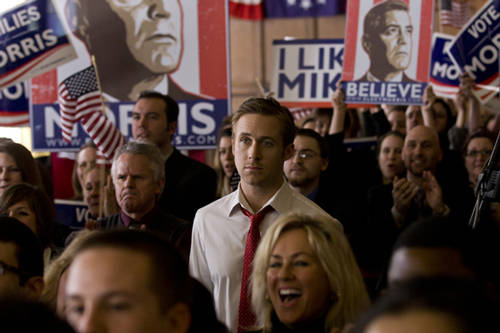Why you can trust GamesRadar+
You got something the other guys don’t have,” Paul Giamatti tells Ryan Gosling in The Ides Of March. “You exude something. You draw people in.”
Giamatti is talking about Gosling’s character Stephen Meyers, an idealistic press secretary whose success at propelling a Democratic candidate towards the Presidency has made his Republican rival jittery enough to try and woo him to the opposing camp.
Yet it’s hard not to use the same words to describe Gosling himself, so compelling a presence he’s become in what seems like only a few short years.
So it’s tempting to see this polished political thriller as a symbolic handing of the torch from one generation to another: silver fox George Clooney – director, producer, co-scripter – magnanimously gifting a platform for the fresh face on the Hollywood block. But Clooney the film star isn’t going down without a fight.
Which probably explains why Clooney the director has cast himself as Mike Morris, the charismatic governor whose campaign Meyers is orchestrating in the run-up to a pivotal primary in the great state of Ohio.
The only way is ethics
Clooney’s fourth venture behind the camera is a warts-and-all look at running for office that gradually transforms into a modern morality tale about the price of ambition and the corruption of power. But just who is Morris – a centre-left people pleaser with sufficient charm to make his socialistsounding policies palatable to the masses – supposed to be?
Playwright Beau Willimon, on whose 2008 piece, Farragut North, the film is based, served on the short-lived presidential bid of Howard Dean, whose 2004 run was scuppered by a notorious gaffe that became known as the “I Have A Scream” speech.
Bringing all the latest movie news, features, and reviews to your inbox
Yet Morris’ poster transparently riffs on the “Hope” one that Shepard Fairey designed for Obama, while a scandalous plot development involving Evan Rachel Wood’s flirty intern is so clearly inspired by Clinton’s extramarital conduct she should be named Lonica Mewinsky.
But as its Shakespearean title suggests, The Ides Of March has more on its mind than debate prep and process. It’s really about ethics and values, loyalty and betrayal, ego and hubris – the stuff, in short, of all drama, not just the sort that occurs on the road to the White House.
Ryan agreeing to meet Giamatti’s Tom Duffy behind the back of his seasoned boss Philip Seymour Hoffman might seem like a rookie’s mistake for an operative who’s supposed to be at the top of his game.
Pride, though, has a habit of coming before a fall. Stephen’s mien of coolly arrogant superiority – effortlessly punctured by Wood’s Molly Stearns in an early encounter in his office – alerts us to where his cocksure character is heading.
More problematic is Stephen’s rather naïve faith in Morris, something we can only really swallow by conflating him with Clooney’s real-life do-gooding. (“He’s the only one that is going to actually make a difference in people’s lives!” Gosling states at one point with the fervour of a zealot.)
You don’t need a crystal ball to guess that it might be slightly misplaced, making this supposedly experienced spokesman look a bit of a greenhorn. In Michael Clayton, Clooney played a jaded trouble-shooter whose cynicism concealed an unexpected capacity for decency. Here decency is the
mask, Morris’ urbane appearance hiding a ruthless streak broader than Pennsylvania Avenue and a libido bigger than Colin Farrell’s. How did Stephen miss that?
The March of time
It’s fair to say Ides is bleaker than audiences might be expecting, even with its witty one-liners (“Neville Chamberlain, commander-in-chief!” sighs Meyers after Morris goes all pacifist when quizzed on the military) and eye-catching selection of supporting turns. (Take a bow, Marisa Tomei’s wily reporter and the quietly resurgent Jennifer Ehle in an unbilled cameo as Clooney’s wife.)
Produced in the death throes of the Bush era, Farragut North could hardly have been untouched by the
disenchantment and despair of pre-Barack America. But even with Obama’s popularity plummeting, the film has an old-school feel – not least because, like Good Night, And Good Luck, it harks back to the thoughtful, questioning movies of the New Hollywood ’70s.
Yet that, in the end, might be Ides’ salvation. Unlike so many of his peers, Clooney isn’t making movies for the here and now but movies that – Leatherheads apart – will stand the test of time.
Right now, it may be difficult to view this film in the context to which its makers aspire – The Candidate, All The President’s Men and Mr Smith Goes To Washington were all name-checked by George in the run-up to Ides’ Venice premiere.
Who’s to say, though, that in the years to come we won’t be mentioning them in the same breath?
Clooney and Gosling will poll well in this sleek peek at how politicians really get elected, staged with a smart nod to the classic conspiracy yarns of yesteryear.
Neil Smith is a freelance film critic who has written for several publications, including Total Film. His bylines can be found at the BBC, Film 4 Independent, Uncut Magazine, SFX, Heat Magazine, Popcorn, and more.



